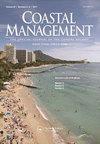改善印度尼西亚海洋保护区蓝碳海草栖息地管理的策略
IF 1.9
4区 环境科学与生态学
Q4 ENVIRONMENTAL SCIENCES
引用次数: 13
摘要
印度尼西亚的海草栖息地在应对气候变化方面发挥着重要作用,因为它们储存了世界上很大一部分的蓝碳。尽管保护工作取得了进展,印度尼西亚海洋保护区(MPAs)的数量也在增加,但这些栖息地通常仍面临着多种压力,导致其状况不断下降。因此,越来越需要改善对海草生境的养护管理,特别是在印度尼西亚的海洋保护区内。在这里,我们确定了管理印度尼西亚海洋保护区海草草甸的五大挑战:(1)提高社会对印度尼西亚海洋保护区海草重要性的认识;(2)获得印尼海洋保护区管理机构的公平认可;(三)取得有关海草管理法律法规的政治倡议;(4)提供国家级海草生境的长期重复经验数据;(5)加强以社区为基础的海草管理能力。然后,我们提出了一系列解决这些挑战的方案。我们认为,所有利益相关者都需要共同努力,以确保印尼海草栖息地的未来,并保持其提供重要生态系统服务的能力。本文章由计算机程序翻译,如有差异,请以英文原文为准。
Strategies to Improve Management of Indonesia’s Blue Carbon Seagrass Habitats in Marine Protected Areas
Abstract Indonesia’s seagrass habitats play an important role in the fight against climate change since they store a significant portion of the world’s blue carbon. Despite progress in conservation efforts and increasing number of Indonesia’s marine protected areas (MPAs), these habitats are generally still under multitude of pressures leading to declining condition. Thus, there is a growing need to improve the conservation management of seagrass habitats, especially within MPAs in Indonesia. Here, we identify five challenges on managing seagrass meadows in Indonesia’s MPAs: (1) Achieving societal awareness on the importance of seagrasses in Indonesia’ MPAs; (2) Achieving fair recognition from the management authority of Indonesia’s MPAs; (3) Obtaining political initiatives related to laws and regulations on seagrass management; (4) Providing empirical data on seagrass habitats at national level repeated over time; and (5) Enhancing capacity to conduct community-based management of seagrasses. Then, we propose a series of solutions to solve these challenges. We believe that all stakeholders need to work collaboratively to secure the future of Indonesia’s seagrass habitats and maintain their capacity to deliver significant ecosystem services.
求助全文
通过发布文献求助,成功后即可免费获取论文全文。
去求助
来源期刊

Coastal Management
环境科学-环境科学
CiteScore
6.00
自引率
0.00%
发文量
24
审稿时长
>36 weeks
期刊介绍:
Coastal Management is an international peer-reviewed, applied research journal dedicated to exploring the technical, applied ecological, legal, political, social, and policy issues relating to the use of coastal and ocean resources and environments on a global scale. The journal presents timely information on management tools and techniques as well as recent findings from research and analysis that bear directly on management and policy. Findings must be grounded in the current peer reviewed literature and relevant studies. Articles must contain a clear and relevant management component. Preference is given to studies of interest to an international readership, but case studies are accepted if conclusions are derived from acceptable evaluative methods, reference to comparable cases, and related to peer reviewed studies.
 求助内容:
求助内容: 应助结果提醒方式:
应助结果提醒方式:


